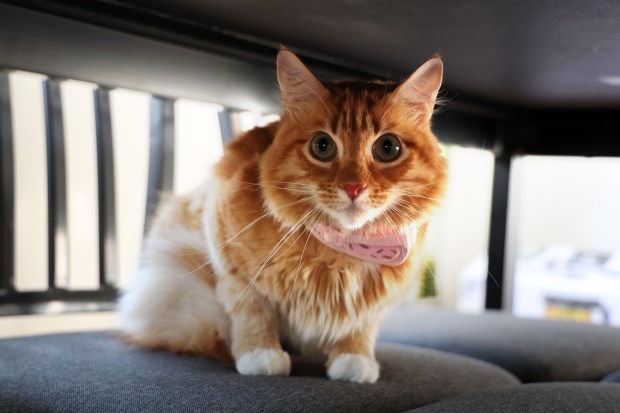They say love comes suddenly and unexpectedly, sometimes during the most tumultuous times, said Carlos Salazar, a native of Venezuela who now lives in Rogers Park.
He met his partner Efren Monsalve in Peru after they escaped the turmoil and economic crisis ravaging their home country. They found a home in each other, they said, now sitting on a couch in their apartment, seemingly a million miles from friends and family.
But their family wasn’t complete. They’d been missing their cat, Katzel, after they had to make the difficult decision to leave her in Peru when they were accepted into a resettlement program that allowed them to immigrate to the U.S. as refugees.
The couple thought they would never see her again. But on Sept. 18, they reunited with Katzel in Chicago thanks to a new program under the Society for the Prevention of Cruelty to Animals, a global nonprofit organization with a mission to advance the safety and well-being of animals.
More than a dozen other pets have been rescued and reunited with displaced families, mostly in the United States, said Lori Kalef, director of programs at SPCA. The initiative began in 2021 when millions of Afghans had to leave their pets behind after fleeing the war. Thanks to SPCA more than 60 families reunited with their pets.
Now the program is open to migrants, asylum-seekers, and refugees worldwide who wish to reunite with pets. Kalef hopes that Katzel is only the first of many stories in Chicago.
“Welcome to Chicago, mi amor,” Salazar told Katzel as he took her out of the carrier when they handed her to them at O’Hare International Airport. The orange and white striped cat with big eyes, meowed loudly as she licked his face.
Salazar found Katzel one evening in Peru in 2020 while he was making his way home after buying groceries. She was under a car, dirty, meowing for help, he said.
He picked her up and decided to take her home, hoping that he would find her a safe place to live. But he immediately fell in love with the cat, he recalled.
It didn’t take long before he decided to keep her. After all, he had been living alone in a small room in an apartment in Peru since migrating from Venezuela.
“Katzel was playful and loving. She made me happy because I finally had someone to come home to,” Salazar said.
Shortly after, Salazar introduced her to Monsalve, who was not much of a cat lover, he said laughing. But it took only a few months before the three decided to live together.
“Little by little she began to win my heart and now she has it all,” Monsalve said.
When the couple learned they had been accepted into the resettlement program under Refugee One to migrate to the U.S. legally earlier last year, and they found out that they had to leave Katzel behind. It was a bittersweet moment..
“She is a part of us, our daughter, our family. We couldn’t leave her as if she was a toy,” said Salazar.
So they asked a friend in Peru to watch her and promised they would raise money to find a way to bring her to Chicago.
When the couple arrived, they began searching for possible ways to bring her until someone gave them a flyer of the refugee assistance program under SPCA. Though Salazar had little hope, he applied anyway.
Within a day, their application had been accepted and within a month, Katzel was home with them in Chicago.
“We are extremely grateful for their help and their love and understanding of the love that we have for our cat because pets are a part of the family and we are oftentimes forced to leave them behind when we have to make difficult choices,” said Salazar.
Like Salazar and Monsalve, millions who migrate to other countries due to economic or political turmoil of their own, often leave their pets behind despite them being integral to their families, Kalef said.
The idea to rescue them came about after hundreds of cats and dogs were left in Afghanistan and the organization stepped in to help. That’s when they realized that many of them belonged to refugees so the program was conceived “out of compassion for families who were already facing the trauma of displacement and the additional heartbreak of having to leave their beloved pets behind.”
Kalef said that most resettlement programs don’t offer families an opportunity to bring their pets with them and until they stepped in, there were few or zero options available to help displaced families reunite with pets.
The process, which covers all logistics and travel, could cost anywhere from $5,000 to $10,000 per pet depending on which country they’re working with, Kalef said. It is fully funded by donors for applicants who get accepted.
“Few people realize the meaning of a pet in people’s lives and the difference that they can make as they start a new life,” Kalef said. “When there’s a will, there is always a way, and we make it happen.”
Both Salazar and Monsalve work at a chocolate factory in the Chicago area. They take English classes in the evenings and spend their weekends with Katzel, who walked between their legs and meowed from time to time, as if she were begging them to caress her.
Though their families are in Venezuela and they don’t know when or if they’ll ever see them again, they say they find comfort and love in each other.
larodriguez@chicagotribune.com



